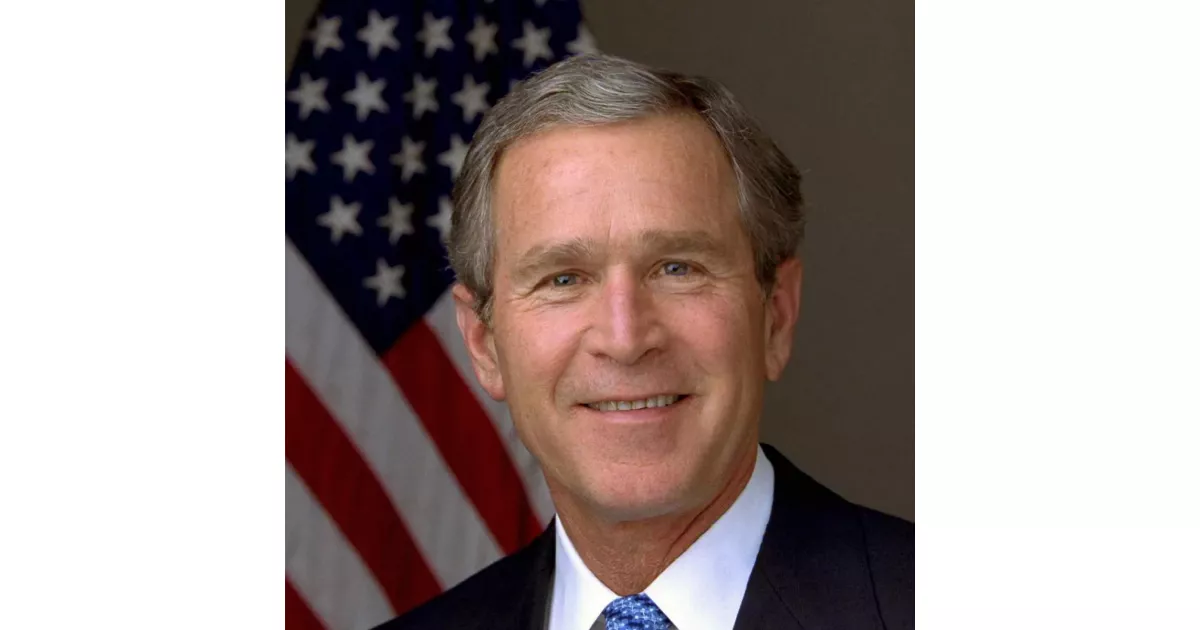A closer look at the defining struggles that shaped George W. Bush's life and career.
George W. Bush, the 43rd U.S. President (2001-2009), is a Republican politician, businessman, and former U.S. Air Force officer. The son of President George H.W. Bush, he previously served as the 46th Governor of Texas (1995-2000). His presidency was largely defined by the September 11th terrorist attacks in 2001, which led to the launch of the War on Terror, including military interventions in Afghanistan and Iraq. Domestically, he enacted education reform legislation known as No Child Left Behind and signed tax cuts into law. His administration also faced criticism for its handling of Hurricane Katrina and the 2008 financial crisis.
1978: Ran for U.S. House of Representatives
In 1978, George W. Bush ran for the U.S. House of Representatives from Texas's 19th congressional district but lost the election to Kent Hance.
1991: Continued Presence of U.S. Troops in Saudi Arabia
The continued presence of U.S. troops in Saudi Arabia after the 1991 Gulf War was one of the stated motivations behind the September 11 attacks.
2000: Federal Government Spending and Revenues in 2000
In 2000, federal government spending was $1.789 trillion and revenues were $2.025 trillion.
2000: Poverty Rate in 2000
In 2000, the poverty rate was 11.3%.
2000: Fiscal Year 2000 Surplus
In fiscal year 2000, the U.S. had a surplus of $237 billion, the third consecutive and largest surplus ever.
January 2001: Unemployment Rate in January 2001
In January 2001, the unemployment rate was 4.2%.
February 7, 2001: Shots fired at the White House
On February 7, 2001, while George W. Bush was in the White House residence, Robert W. Pickett fired a number of shots from a Taurus .38 Special revolver towards the White House. Pickett was apprehended and charged with firearms violations and assaulting a federal officer.
April 2001: Hainan Island Incident
In April 2001, George W. Bush expressed U.S. support for the defense of Taiwan following the stand-off with China over the Hainan Island incident, where a U.S. surveillance aircraft collided with a People's Liberation Army Air Force jet, leading to the detention of U.S. personnel.
September 11, 2001: September 11th Terrorist Attacks
On September 11, 2001, terrorist attacks reshaped George W. Bush's administration, leading to the War on Terror and the creation of the Department of Homeland Security.
October 7, 2001: Initiation of Bombing Campaigns in Afghanistan
On October 7, 2001, U.S. and British forces initiated bombing campaigns in Afghanistan, leading to the arrival of Northern Alliance troops in Kabul on November 13. The main goals of the war were to defeat the Taliban and drive al-Qaeda out of Afghanistan.
December 2001: Osama bin Laden Escapes in Tora Bora
In December 2001, al-Qaeda leader Osama bin Laden escaped a battle in the mountainous region of Tora Bora. The Bush Administration later acknowledged that this resulted from a failure to commit enough U.S. ground troops.
December 2001: Taliban Defeat Reported, Continued War Cautioned
In December 2001, the Pentagon reported that the Taliban had been defeated in Afghanistan, but cautioned that the war would continue to weaken Taliban and al-Qaeda leaders. Later that month, the UN installed the Afghan Transitional Administration chaired by Hamid Karzai.
2001: Bush's Tax Cut Plan and Economic Concerns
In 2001, George W. Bush proposed a $1.35 trillion tax cut program, arguing that the surplus was the people's money. Federal Reserve chairman Alan Greenspan warned of a recession, while Treasury Secretary Paul H. O'Neill opposed some tax cuts due to concerns about budget deficits and Social Security.
2001: Dow Jones at Start of Bush's Presidency
In 2001, when George W. Bush entered office, the Dow Jones Industrial Average was at 10,587.
November 2002: UN Weapons Inspectors in Iraq
In November 2002, Hans Blix and Mohamed ElBaradei led UN weapons inspectors in Iraq, but were advised by the U.S. to depart the country four days prior to the U.S. invasion, despite their requests for more time to complete their tasks.
2002: Withdrawal from Anti-Ballistic Missile Treaty
In 2002, George W. Bush withdrew U.S. support for the Anti-Ballistic Missile Treaty (ABM) with Russia, marking the first time the U.S. had withdrawn from a major international arms treaty in post-World War II history. Vladimir Putin, the Russian president, stated that this American withdrawal from the ABM Treaty was a mistake.
March 20, 2003: Invasion of Iraq
On March 20, 2003, the United States, along with the "coalition of the willing", initiated the invasion of Iraq. The Iraqi military was quickly defeated.
April 9, 2003: Fall of Baghdad
On April 9, 2003, Baghdad, the capital of Iraq, fell to U.S. forces during the invasion of Iraq.
June 2003: Unemployment Rate in June 2003
In June 2003, the unemployment rate rose to 6.3%.
2003: Initiation of President's Emergency Plan and Invasion of Iraq
In 2003, George W. Bush initiated the President's Emergency Plan for AIDS Relief and ordered the invasion of Iraq, based on the false belief that Saddam Hussein's regime possessed weapons of mass destruction.
2003: Another Tax Cut Passed
In 2003, another tax cut was passed as the economy showed signs of improvement, though job growth remained stagnant.
2003: Bush Administration Pushed for Increased Regulation of Fannie Mae and Freddie Mac
In 2003, the Bush administration pushed for increased regulation of Fannie Mae and Freddie Mac. The regulations passed the House but died in the Senate.
2003: Clear Skies Act Failed to Pass
In 2003, the Clear Skies Act failed to make it out of committee in Congress.
December 2004: Approval rating falls below 50 percent
In December 2004, George W. Bush's approval rating fell below 50 percent in AP-Ipsos polling. Afterwards, approval ratings for his handling of domestic and foreign policy steadily declined.
2004: Bush's Re-election Campaign
In 2004, George W. Bush campaigned for re-election with broad Republican support. He emphasized commitment to the wars in Iraq and Afghanistan, support for the USA PATRIOT Act, constitutional amendments banning abortion and same-sex marriage, reforming Social Security, creating an ownership society, and opposing mandatory carbon emissions controls. He also proposed a guest worker program for immigrants.
2004: Poverty Rate Peak in 2004
In 2004, the poverty rate peaked at 12.7%.
May 10, 2005: Grenade thrown at Bush during speech
On May 10, 2005, during a speech in Freedom Square, Vladimir Arutyunian threw a live Soviet-made RGD-5 hand grenade toward the podium where George W. Bush was speaking. The grenade landed in the crowd but did not detonate.
July 2005: Arutyunian arrested
In July 2005, Vladimir Arutyunian, who threw a grenade at George W. Bush on May 10, was arrested. During the arrest, he killed an Interior Ministry agent.
2005: Campaigning for Social Security Reform
In 2005, George W. Bush embarked on a national tour, campaigning for his Social Security reform initiative in media events known as "Conversations on Social Security." However, public support declined, and the proposal's legislative prospects were further diminished by political fallout from the response to Hurricane Katrina.
2005: Social Security Reform Initiative
In 2005, George W. Bush outlined a major initiative to reform Social Security, which included partial privatization of the system and personal Social Security accounts. He discussed the potential impending bankruptcy of the program in his 2005 State of the Union Address.
2005: Hurricane Katrina Devastates the Gulf Coast
In 2005, Hurricane Katrina, one of the most damaging natural disasters in U.S. history, devastated much of the north-central Gulf Coast of the United States, particularly New Orleans.
2005: Failure of Operation Red Wings
The 2005 failure of Operation Red Wings showed that the Taliban had returned.
January 2006: Arutyunian convicted and sentenced
In January 2006, Vladimir Arutyunian was convicted for throwing a grenade at George W. Bush in May 2005 and was sentenced to life in prison.
August 2006: NSA Surveillance Program Ruled Unconstitutional
In August 2006, a U.S. district court judge ruled that the NSA electronic surveillance program was unconstitutional.
October 9, 2006: North Korea's Nuclear Detonation
On October 9, 2006, North Korea's detonation of a nuclear device complicated President Bush's foreign policy.
October 17, 2006: Signing of Military Commissions Act
On October 17, 2006, President Bush signed the Military Commissions Act of 2006 into law, allowing the U.S. government to prosecute unlawful enemy combatants by military commission and denying detainees access to habeas corpus while barring torture.
2006: Funding Cut for NIH in 2006
In 2006, funding for the National Institutes of Health (NIH) was cut, the first such cut in 36 years, due to rising inflation.
2006: Unfavorable opinion in most countries
In 2006, surveys found that most respondents in 18 of 21 countries around the world held an unfavorable opinion of George W. Bush, judging his administration as negative for world security.
2006: Democrats regain control of Congress
In 2006, the Democratic Party regained control of Congress in the midterm elections. Polls showed an average of 37 percent approval ratings for George W. Bush, which contributed to the Republican Party's defeat, which Bush himself called a "thumping".
2006: Taliban Insurgency
In 2006, the Taliban insurgency appeared larger, fiercer and better organized than expected, with large-scale allied offensives such as Operation Mountain Thrust attaining limited success.
January 10, 2007: Troop Surge in Iraq
On January 10, 2007, President Bush initiated a surge of 21,500 additional troops to Iraq, along with a job program and reconstruction proposals, allocating $1.2 billion for these programs.
January 2007: Troop Surge in Iraq
In January 2007, George W. Bush launched a surge of troops in Iraq.
January 17, 2007: Surveillance Program Subjected to Judicial Oversight
On January 17, 2007, Attorney General Alberto Gonzales informed U.S. Senate leaders that the President would not reauthorize the President's Surveillance Program, but would subject it to judicial oversight.
March 2007: Bush most disliked leader in Arab nations
A March 2007 survey of public opinion in six Arab nations conducted by Zogby International and the University of Maryland found that George W. Bush was the most disliked world leader.
May 1, 2007: Veto of Troop Withdrawal Bill
On May 1, 2007, President Bush vetoed a bill that set a deadline for the withdrawal of U.S. troops from Iraq, insisting that a continued U.S. presence was crucial.
June 28, 2007: Defeat of Comprehensive Immigration Reform Act in the Senate
On June 28, 2007, the Comprehensive Immigration Reform Act was defeated in the Senate, with a cloture motion failing on a 46–53 vote. President Bush expressed disappointment upon the defeat of one of his signature domestic initiatives.
July 6, 2007: Ruling on NSA Surveillance Program Vacated
On July 6, 2007, the United States Court of Appeals for the Sixth Circuit vacated a U.S. district court judge's ruling that the NSA electronic surveillance program was unconstitutional, on the grounds that the plaintiffs lacked standing.
December 2007: Start of Post-World War II Recession
In December 2007, the United States entered the longest post-World War II recession, caused by a housing market correction, a subprime mortgage crisis, and soaring oil prices.
2007: Veto of State Children's Health Insurance Program (SCHIP) Legislation
In 2007, George W. Bush vetoed State Children's Health Insurance Program (SCHIP) legislation, which would have expanded federally funded healthcare benefits to children of some low-income families and was to be funded by an increase in the cigarette tax. Bush viewed the legislation as a move toward socialized health care.
2007: Start of the Post-World War II Recession
In 2007, the United States entered the longest post-World War II recession. This occurred during George W. Bush's presidency, amidst significant domestic debates regarding immigration, healthcare, Social Security, and economic policy. Bush's approval ratings steadily declined during this time.
2007: Bush's approval rating hovers in mid-thirties
Throughout most of 2007, George W. Bush's approval rating hovered in the mid-thirties; the average for his entire second term was 37 percent, according to Gallup.
February 2008: Job Losses in February 2008
In February 2008, 63,000 jobs were lost, marking a five-year record.
March 8, 2008: Veto of Intelligence Oversight Bill
On March 8, 2008, President Bush vetoed H.R. 2082, a bill that would have expanded congressional oversight over the intelligence community and banned the use of waterboarding and other interrogation methods, arguing it would remove a valuable tool in the War on Terror.
April 2008: Disapproval ratings reach record high
In April 2008, George W. Bush's disapproval ratings reached the highest ever recorded for any president in the 70-year history of the Gallup poll, with 69 percent of those polled disapproving of his job performance.
June 9, 2008: Articles of impeachment introduced against Bush
On June 9, 2008, Representative Dennis Kucinich introduced 35 articles of impeachment against George W. Bush on the floor of the House of Representatives. However, Speaker Nancy Pelosi declared that impeachment was "off the table".
September 2008: Intensification of the 2008 Financial Crisis
In September 2008, the 2008 financial crisis intensified with the Federal takeover of Fannie Mae and Freddie Mac, the bankruptcy of Lehman Brothers, and a federal bailout of American International Group for $85 billion.
October 2008: U.S. National Debt in October 2008
By October 2008, the U.S. national debt had risen to $11.3 trillion.
December 14, 2008: Shoes thrown at Bush during press conference
On December 14, 2008, during a press conference in Baghdad, Iraqi journalist Muntadhar al-Zaidi threw both of his shoes at George W. Bush. Bush was not injured, but White House press secretary Dana Perino was bruised by a microphone boom.
December 2008: Shoe-Throwing Incident in Iraq
During President Bush's last visit to Iraq in December 2008, Iraqi journalist Muntadhar al-Zaidi threw both of his shoes at him during a press conference, yelling that they were a "farewell kiss" for the victims of the war.
2008: Approval rating drops to low of 19 percent
By the beginning of 2008, George W. Bush's final year in office, his approval rating had dropped to a low of just 19 percent, largely from the loss of support among Republicans.
2008: Criticism of Bush's handling of the 2008 financial crisis
Critics often point to George W. Bush's handling of the 2008 financial crisis as proof that he was unfit to be president.
2008: Federal Government Spending and Revenues in 2008
In 2008, federal government spending was $2.983 trillion, and revenues were $2.524 trillion. Individual income tax revenues increased by 14%, corporate tax revenues by 50%, and customs and duties by 40%. Discretionary defense spending increased by 107%, discretionary domestic spending by 62%, Medicare spending by 131%, social security by 51%, and income security spending by 130%.
2008: Financial Crisis and Low Approval Ratings
In 2008, the U.S. entered the Great Recession, contributing to George W. Bush leaving office as one of the most unpopular U.S. presidents.
2008: Dow Jones at End of Bush's Presidency
In 2008, when George W. Bush left office, the Dow Jones Industrial Average was at 7,949, one of the lowest levels of his presidency.
2008: Low approval ratings before election
In the fall of 2008, just before the election, George W. Bush's approval ratings remained at record lows of 19 to 20 percent, while his disapproval ratings ranged from 67 percent to as high as 75 percent.
2009: Final job approval rating
In polling conducted January 9–11, 2009, George W. Bush's final job approval rating by Gallup was 34 percent, which placed him on par with Jimmy Carter and Harry S. Truman.
March 2010: Report on False Pretenses for Iraq War
In March 2010, the Center for Public Integrity released a report stating that President Bush's administration had made over 900 false claims in a two-year period about the threat of Iraq to the United States, as a rationale to engage in war in Iraq.
June 2013: PRISM Program Revealed
In June 2013, The Washington Post and The Guardian published reports revealing the existence of PRISM, the NSA's replacement for the President's Surveillance Program.
Mentioned in this timeline

Donald John Trump is an American politician media personality and...

Michelle Obama an American attorney and author served as the...

Barack Obama the th U S President - was the...

Bill Clinton the nd U S President - served as...
Ukraine is a country in Eastern Europe the second-largest on...

Joe Biden is an American politician who served as the...
Trending

3 months ago Michelle Obama: America 'not ready' for a woman president, cites sexism concerns.

1 hour ago Apple MacBook Pro: Touchscreen, Dynamic Island, and New Interface Coming Soon.

16 minutes ago Ethereum Price Faces Resistance at $1,950 Amidst Market Repricing Concerns.
16 minutes ago BP Receives Hold Ratings Amid Strategy Updates and Increased Rating by Argus.
1 hour ago Whitefox & Fluid Quip collaborate; Low-carbon ethanol boosted; Indoor plants aid climate resilience.
1 hour ago HSBC: Enterprise Software Strong, AI Enhances Capabilities, Valuations Historically Low.
Popular

Jesse Jackson is an American civil rights activist politician and...

Susan Rice is an American diplomat and public official prominent...

Barack Obama the th U S President - was the...

Michael Joseph Jackson the King of Pop was a highly...

XXXTentacion born Jahseh Dwayne Ricardo Onfroy was a controversial yet...

Bernie Sanders is a prominent American politician currently serving as...
